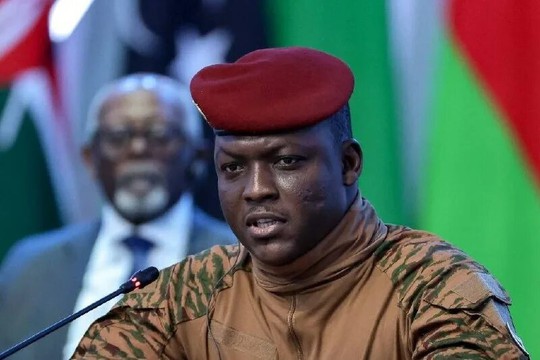Burkina Faso President Ibrahim Traoré.
West Africa is currently at the heart of a highly volatile situation. Since July 26, 2023, Niger has joined the category of military-led countries after Mali, Chad, Guinea and Burkina Faso. On the crisis of elective democracy: “What’s behind the sub-Saharan Harmattan?”, writes Isaac Bazié, directeur/chief editor, Revue Afroglobe, Canada.
Since his speech at the recent Russia-Africa Summit in St. Petersburg, President Ibrahim Traoré has been creating a buzz when he advocated for political, economic, and cultural sovereignty for his country and Africa. The welcome he received on his return to Ouagadougou is a visible sign of strong support from the Burkinabè people, in contrast to the very negative analyses of the military nature of his regime outside Burkina Faso, especially in France and the West.
How can we explain that the people of Burkina Faso did not demonstrate against the coup d’état that ended the “democratically elected” president’s second term in office in January 2022? How to explain that President Ibrahim Traoré, who came to power through a coup d’état, enjoys the kind of popular support that any politician would dream of in election time?
It is not sufficient to explain the political upheavals that have shaken the country in its recent history. A brief look back at these events should help understand: After ending abruptly the revolution led by his companion Thomas Sankara (1983-1987), Blaise Compaoré attempted in 2014 to amend the constitution in order to run for a third term and extend his twenty-seven-year reign at the head of Burkina Faso. On those memorable October days in 2014, thousands of Burkinabè demonstrated their opposition to this constitutional coup, forcing Blaise Compaoré to step down from power in broad daylight; he was exfiltrated by France to Côte d’Ivoire. The popular uprising of 2014 was the sign of a tiredness against corruption, impunity and lack of perspective in a population of which 77.9% are children and young people aged under 35.
Harmattan is a dry, hot wind that blows from the Sahara southwards and even troubles coastal countries in West Africa. This wind blows in a transitional period after the harvest and before the next rainy season; the harmattan brings with it its share of dust, daytime heat and night-time cold, as well as its share of disease. It’s also a symbol of a time of transition and turmoil, like that of the independence era in 1958-1960.
The political harmattan currently blowing in Burkina Faso is the result of several processes that have reached their historical maturity: the first is that of partial decolonization in the 1960s, which showed its limits in the facade independence of French-speaking countries that remained economically and politically under the influence of their former colonizer, France; the second process nourishing this harmattan is related to the first: the imposition of elective democracy, which has been implemented without any popular base or political education, and which military men like Blaise Compaoré were able to use to keep themselves in power, democratically for 23 years!
The sanctions policy makes countries like Burkina Faso more innovative on their way to sovereignty. What most Western, particularly French mainstream media don’t show – except the terrorist attacks – is the tremendous mobilization of the majority of Burkinabè people behind the army and President Ibrahim Traoré in his fight for territorial integrity, political sovereignty, social justice and economic development.
The sub-Saharan Harmattan is a hot political wind blowing over some countries (Mali, Guinea, Tchad, Niger). It feeds on the bitter fruits of neo-colonialism whose make-up has cracked, but it also feeds on exasperation against local leaders who are not taking urgent action to responding to the pressing challenges of development, good governance, social justice and insecurity. This hot wind doesn’t care about national postcolonial borders, nor does it spare “elected presidents” or “historic partners” (neo-colonial, imperialist powers).
In a word, the sub-Saharan harmattan conceals an irreversible historical turning point. No one can exactly predict what will come up after the dust of the political harmattan will settle. But for sure, nothing will ever be the same again.
…After a long historical pause, Africa is coming again to the frontline of world politics.
read more in our Telegram-channel https://t.me/The_International_Affairs

 11:35 24.08.2023 •
11:35 24.08.2023 •























